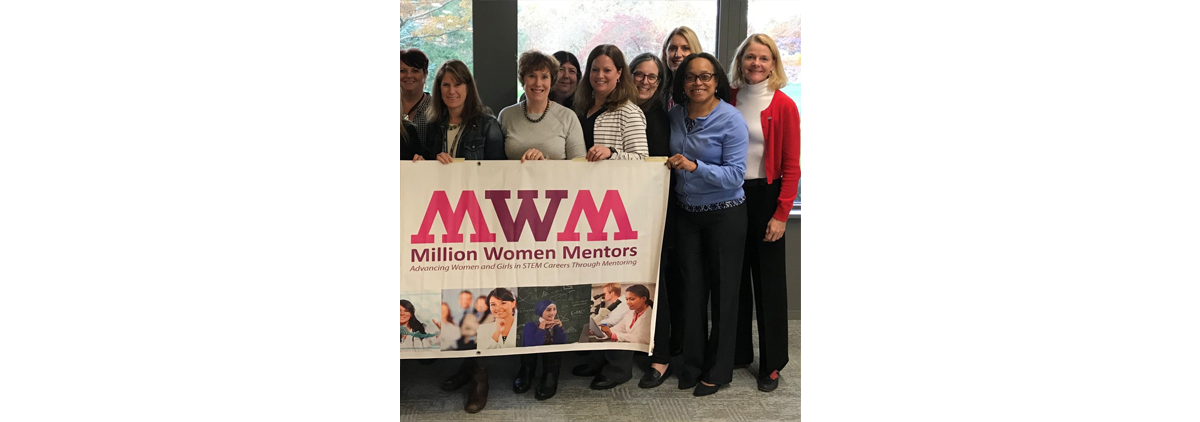Simply put, the world needs more mentors.
According to one study, more than 75% of professional employees reported wanting to have a mentor, while only 37% actually did. Cliona Murphy, on the other hand? PepsiCo’s Vice-President of Global Quality Assurance has had several mentors over the
course of her career (“I still stay in touch with some,” she says) — and estimates she’s mentored at least one hundred people herself. Yes, one hundred.
“Talent is the future,” she explains. “And we need that talent to come from everywhere. We need it to be gender-diverse, ethnically diverse, we need diversity of thinking — and mentoring is a part of bringing that talent along.”
Talent is the future. And we need that talent to come from everywhere.
Though Cliona’s day job focuses on leading a global team of engineers and scientists who design and implement quality assurance systems, she also serves as the executive global lead of PepsiCo’s relationship with Million Women Mentors, or
MWM. A program that leverages mentorship as a means of inspiring, developing and retaining women who seek to work in STEM (Science, Technology, Engineering, and Math) fields, MWM was founded in 2014 in partnership with PepsiCo.

Cliona (third from left) with program participants at the first global Million Women Mentors meeting in 2018.
“It’s that old philosophy that if you can’t see it, you can’t be it,” explains Cliona, who, as a trained engineer turned top-tier executive, has firsthand experience building an ambitious career in STEM. “And if you can see
it, you can be it.” Given some of the U.S. numbers — roughly 25% of STEM graduates are women, though they make up more than 50% of the enrollment at most colleges — it’s clear that there is progress to be
made.
Under Cliona’s leadership, the MWM partnership has grown to encompass four thriving chapters within PepsiCo in the United States, in addition to hubs in Canada, Ireland, Europe and India. Mexico launched in late October with a record-smashing 118
mentor-mentee pairings on its very first day. Next up: continued expansion across Europe and the UK; a launch in Hyderabad, India, in support of that branch’s Global Business Services team; and potential future chapters in China and Brazil.
A typical MWM mentorship at PepsiCo begins when a volunteer mentor is paired with a mentee with similar professional interests for one year. The relationship either ends there (if the mentee has reached their goals), or can evolve into a longer-term connection.
“Every mentorship is different,” Cliona explains, “so as it evolves you find your own rhythm.”
The number-one challenge Cliona feels young women face when pursuing STEM careers is self-confidence. “‘Am I strong enough at math?’ ‘Will there be other women in my class?’” she muses, before playing
out the thought. “Our mentors are really providing confidence.”
Our mentors are really providing confidence.
She also cites issues with work-life balance and lack of access to role models as the kinds of barriers that can derail women pursuing STEM careers, which, at PepsiCo, range from data analytics and food science to environmental engineering at the company’s
manufacturing plants. And then there is the matter of maternity leave: by the time many women return to the workplace, “the whole organization has changed,” Cliona points out. “So tapping back into your mentor when you come back
is a really good idea.”
It’s not just the mentees who stand to gain from such interactions. Cliona says that as a mentor, she benefits every bit as much: “A really strong relationship is one where you're actually learning from each other,” she explains. “I
have a number of mentees that I'm currently mentoring where I have that kind of relationship. And I think that's terrific.”
To date, PepsiCo’s MWM volunteers have mentored hundreds of young women in STEM. Some work within PepsiCo, while others have been connected via external organizations aimed at helping women in underserved communities. To stay organized, Cliona
color-codes her calendar so she can see how much time she’s spending on mentorship versus quality assurance, global research and development, and other responsibilities. “It's a good visual way of reminding myself,” she explains.
“I should be mentoring somebody every week; if I'm not doing that I’m not being true to MWM...it’s important for me.”
The program’s global ambitions are a natural fit for the Dunleer, Ireland native, whose 23-year career at PepsiCo has seen her “rummaging through cupboards” in locales ranging from San Francisco, California to Lahore, Pakistan in search
of cultural learnings to drive future product development. Her most memorable culinary experiences came in China, where she sampled fried scorpion, deliciously delicate sea urchin and steamed dumplings. (Was there ever anything she didn't like? “Sea
cucumber.” She grimaces fondly at the memory. "I really hope not to eat one again.")
Cliona had long grown used to traveling two weeks out of four and spending the down weeks catching up on sleep and connecting with family. But in COVID-19 times, her days have been spent mostly at home in Cork, Ireland, and she has embraced hobbies: kayaking,
reading, walking Pippin, her West Highland terrier, and — a new one — playing bridge. “I do feel like I'm turning into my mother a little bit,” she laughs.
So, what would this wiser version of Cliona Murphy say to her younger self, and to all the young women in STEM who might like to follow in her footsteps? “First, don't let anybody tell you you can't do something,” she says, with a firmness
that conveys her conviction. “Never believe it if somebody tells you that. And the second one is, don't forget to reach back and give the person behind you a hand up.”